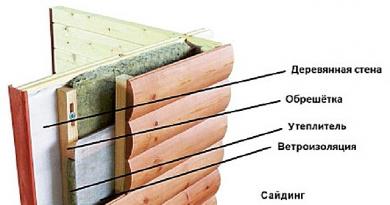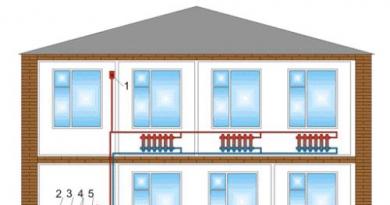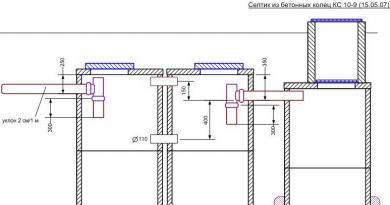A comfortable existence is impossible without sewage. In a private house or in the country, this is usually a cesspool or septic tank. The second option is more environmentally friendly and safe - a septic tank. It decomposes waste into insoluble sediments, which fall to the bottom, forming silt, and fairly clean water, which is usually discharged into the ground for further additional purification. Probably the most popular version of this installation is a septic tank made of concrete rings. The technology of its construction is simple, you can build it yourself, the cost is relatively low. This explains its popularity.
Device and principle of operation
A septic tank made of concrete rings is best placed on well-draining soils that are not prone to frost heaving. The body of a septic tank consists of several rings placed on top of each other. Even if they have tabs for better fixation, even if they are stapled together, the frost heaving will move them. The result is leakage and costly repairs. And not the fact that after the repair it will not move again. Therefore, it is recommended to make a septic tank from concrete rings on sandy or sandy loam soils.
If the soils drain water well, the groundwater level is low, it makes sense to drain the water from the septic tank into the drainage column. Such a device is the most optimal. At a high level of groundwater, treated wastewater is diverted to drainage fields. Their device requires large areas and no less substantial amount of earthworks, but sometimes only such a system works.
The septic tank diagram is shown in the photo above. It consists of two working chambers connected by an overflow. The cleaning process takes place in them. The third column is a drainage well (instead of it there may be a filtration field), through the holes in the lower part of which purified water goes into the ground. This is briefly about the device of a septic tank made of concrete rings. Now about the process itself.
The effluent enters the first chamber. It is sealed, with the most limited air flow. Under conditions of oxygen deficiency, the main decomposition process takes place in it. Organic matter is processed by microorganisms and bacteria. Organic matter breaks down into more or less pure water and insoluble substances, which precipitate and accumulate at the bottom of the chamber.
Through the overflow pipe, water with less contamination enters the second chamber. The purification process continues in it, but here it takes place with the obligatory participation of oxygen. Therefore, the second chamber is equipped with a ventilation pipe. Here the remains of organic matter decompose and settle to the bottom. Almost pure water is discharged into the drainage column and goes into the ground, where their final post-treatment takes place.
The dimensions of the septic tank chambers and their number
In order for the drains to be effectively cleaned, they must be in the septic tank for at least 3 days. Based on this, the dimensions of the cameras are determined.
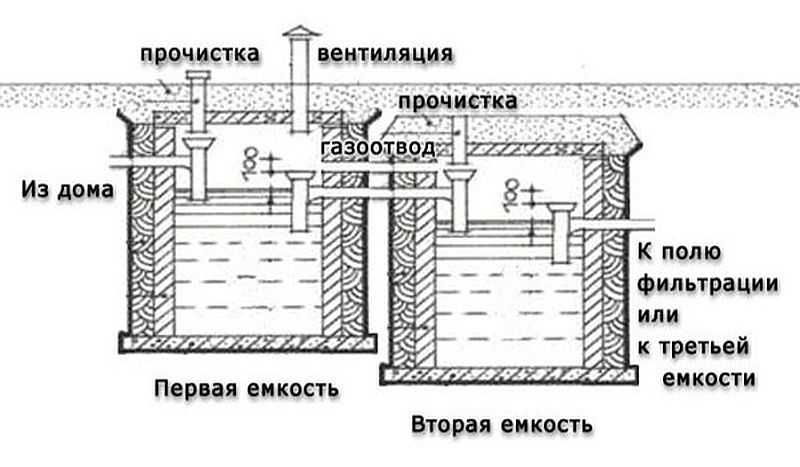
How to determine the volume of a septic tank
According to the standard, the minimum volume of the septic tank is three times the daily water consumption. One person counts 200-250 liters. In total, if you have 4 people in your family, the minimum volume is 3 cubes. The storage tanks, that is, the first two chambers, should hold so much. The third - the filtering column - does not in any way apply to accumulative ones, therefore it is not taken into account.
This was about the standards that are in force in Russia. In Europe, the minimum volume of a septic tank is 6 cubic meters. And many people think that such dimensions are more "correct". Large volumes of wastewater are stored in storage tanks longer, which means they are cleared better. When using the native standard, in the event of the arrival of guests, it is easy to "overflow" the norm. As a result, untreated wastewater will end up in the filtration column, which will pollute it and the entire surrounding area. Elimination of the consequences is an expensive and complicated procedure.
Even if you decide to adhere to Russian norms, if you have a bathroom, washing machine and dishwasher, you need to increase the volume at least by the size of the salvo discharge of all these devices (bathroom - 300 liters, washing machine and dishwasher 50 and 20 liters, all together - we will consider 400 liters or 0.4 cubic meters).
In accordance with the calculated volume, the sizes of the rings and their number are selected. The diameter of the concrete ring can be from 80 to 200 cm, sometimes there are rings with a diameter of 250 cm. The height is from 50 cm to 1 m. The table below shows the dimensions of standard reinforced concrete rings, their markings, weight and volume. In the column "dimensions", the outer diameter, inner diameter, and height are indicated through a fraction. All values are in millimeters.
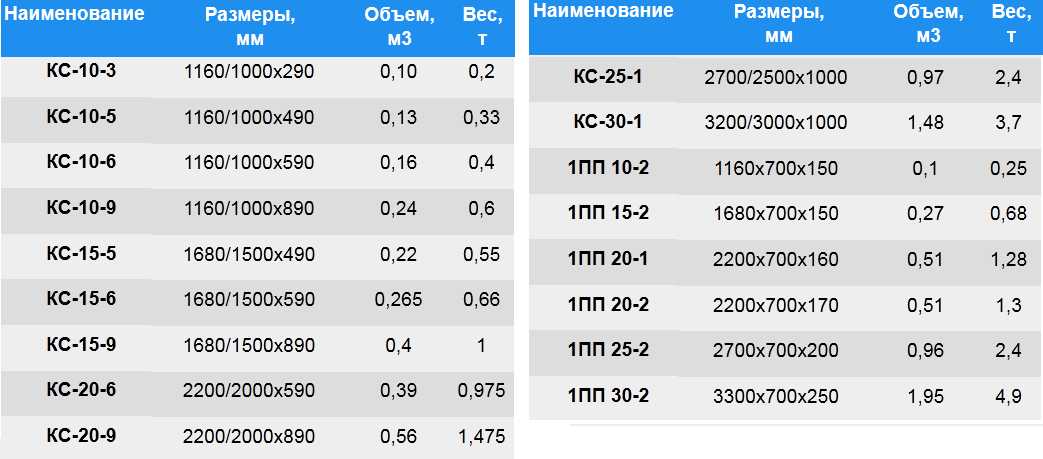
When calculating, keep in mind that the actual volume of the column must be higher than the calculated one - the drains never completely fill, but rise only to the level of the installed overflow pipes. It is up to the level of these pipes that the calculated amount of drains should be placed.
Number of columns
There can be three storage chambers in a septic tank (except for the filter column). Sometimes such a device is more practical - if it is required, for example, to install six or more rings in each of the columns. The depth of the pit in this situation turns out to be large. It is more convenient / more profitable to make three columns of four rings.
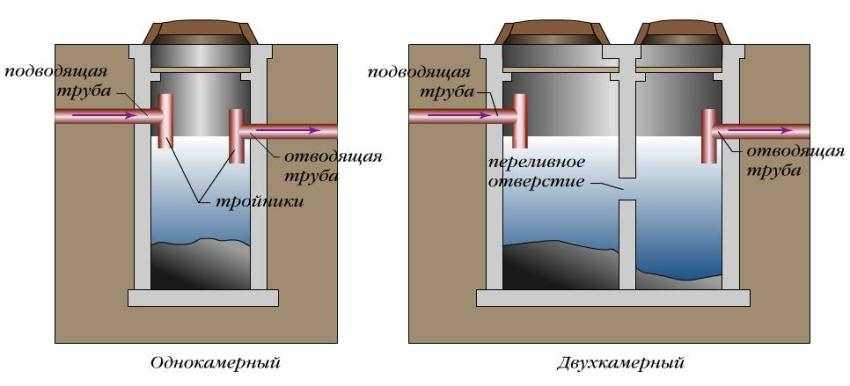
There may be a reverse option - a small volume of a septic tank is required. This happens at dachas of periodic visits with a small number of summer residents serving it. In this case, the column can be assembled alone by dividing the rings inside with a sealed partition. and making the overflow hole at the required level.
How to do
The most common construction principle is linear. All columns are lined up. Accumulative reservoirs can be located nearby, and the filtering one - at some distance from them and preferably farther away so that the flowing water does not saturate the soil and does not freeze, increasing the phenomenon of frost heaving.
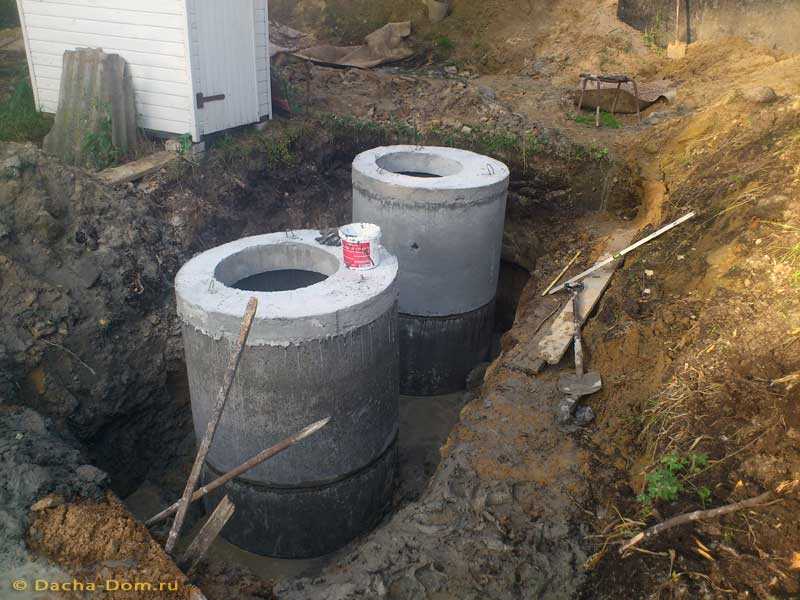
General rules for storage columns
It is better to take rings for a septic tank with locks. They are easier to install, they are less likely to move with frost heaving, the degree of sealing is higher. Before installation, it is advisable to treat them with a coating waterproofing. Bituminous mastic and cement-based deep penetration impregnation (Penetron type) give good results. With this treatment, nothing will leak out of the septic tank, and groundwater will not get inside.
The rest of the rules for constructing a septic tank from concrete rings are as follows:
- The optimal distance between the storage columns is 0.5 m. This gap, filled with soil, will act as a buffer during ground movements.
- A layer of crushed stone about 20 cm thick is poured and rammed at the bottom of the pit. It is rammed to a high density, better - using a powerful rammer. The filling surface must be strictly horizontal and flat, without drops. The plane is checked using a building level at least 1.5 meters long (preferably 2 meters).
- On tamped crushed stone:
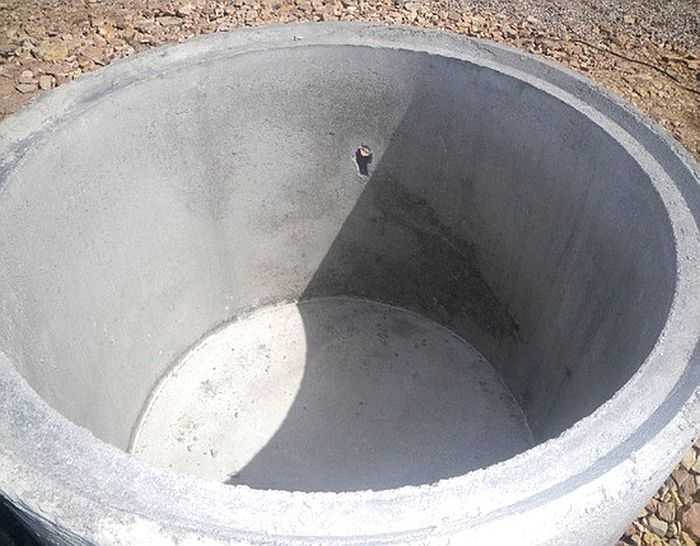
- All subsequent ones are installed on the first ring. The joint of each is carefully sealed. You can lay out a layer of the same Aquacement before installing the ring on the side. After installing all the rings, the joints are once again coated with a waterproofing solution from the inside and outside. It is impossible to use toxic compounds inside - bacteria that respond to the decomposition of bio-inclusions will die and the septic tank will not work.
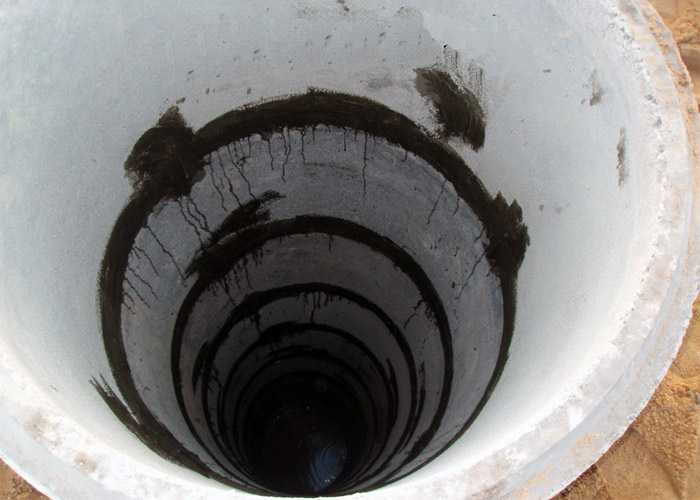
- For a more durable fixation of the rings, they are connected with metal brackets (installed outside. The places of the “entrance” of the brackets are concreted, coated with waterproofing.
- It is advisable to insulate the upper part of the septic tank (above the freezing depth). For this purpose, a polystyrene "shell" is used or expanded polystyrene cut into strips is glued. The drains, of course, are warm, but in severe frosts there is a risk of ice crust formation, which reduces the effectiveness of purification. Therefore, insulation is desirable.
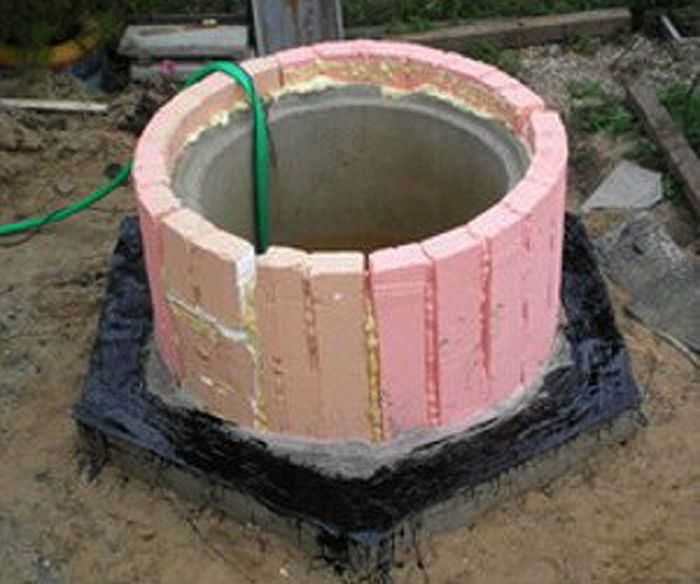
- For reasons of economy, necks are made at the top of the septic tank columns. Sewer pipes along the site are usually buried below the freezing depth of the soil. It is 1.5-1.7 meters in Central Russia. And they must also go with a bias. Let the slope be small, but since the length of the track is large (no closer than 8 meters from the house), quite a decent amount runs up. In total, it turns out that the sewage system enters the septic tank near the 2 meter mark and the entire part of the column, which is located above, is empty. So they reduce it with the help of golovans, which can be done:
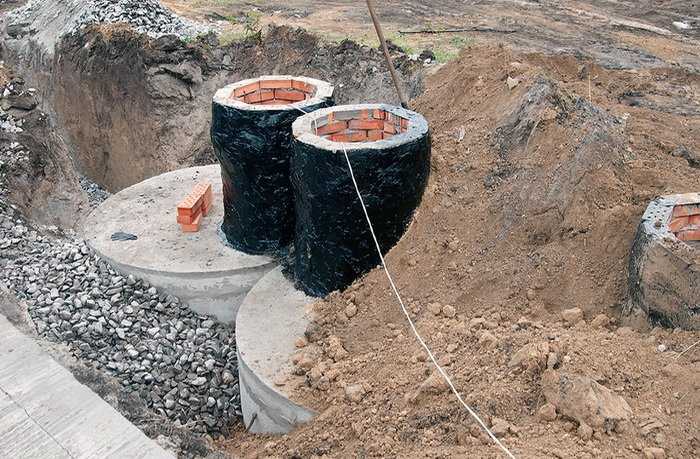
- The overflow pipe between the chambers of the septic tank is made with a diameter of 110-120 mm. It can be made of asbestos or plastic. Its entrance is carefully sealed.
- The inlet pipe that comes from the house and the overflow pipes between the chambers are equipped with tees. This directs the effluent downward, preventing the crust from eroding (it is needed for better effluent treatment). Sometimes tees are equipped with pipes going down.
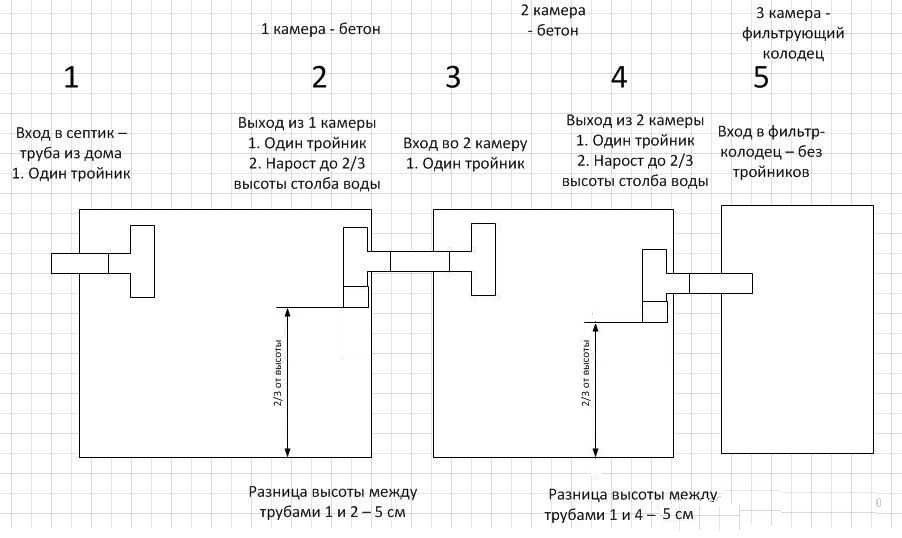
- The location of the overflow pipes is determined by the level of the inlet pipe (from the house). The overflow on the opposite wall should be 5 cm below this level. Between the second chamber of the sump and the filtration well, the overflow can be done at the same level, or lower it by the same 5 cm.
Features of the construction of a filtration well
When constructing a filtration column, the foundation pit is dug up to soils that drain water well. A layer of crushed stone 20-25 cm thick is poured onto the bottom, on top of it is a layer of sand 30-40 cm thick. Rings without a bottom are installed on this backfill. In some cases, a perforated ring is placed - holes of at least 30-50 mm in diameter (there are, by the way, factory ones).
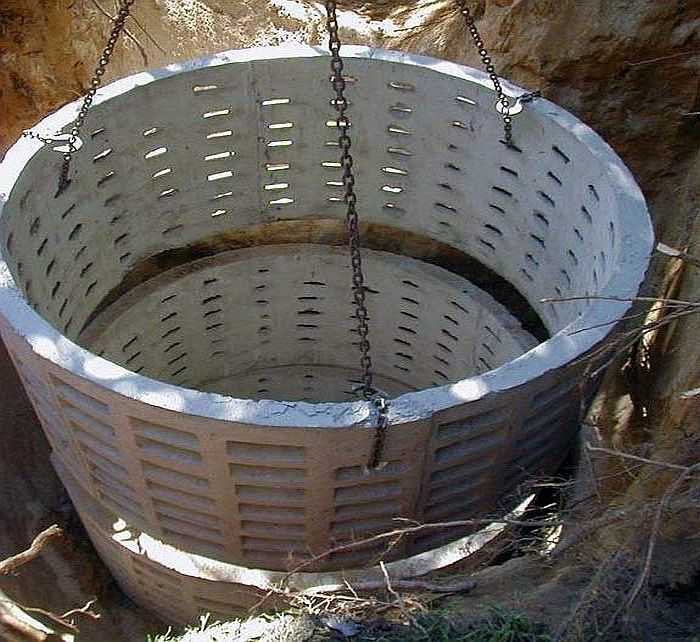
When installing a perforated ring, it is also advisable to replace the soil around it with crushed stone. This is necessary for the water to drain better. The rest of the structure of a filtration well made of concrete rings is the same.
How to bury septic tank rings
The most common way is to dig a common pit, install rings with a crane, lay overflow pipes, seal all joints / cracks, seal, insulate, then fill and compact the soil. All is well, except that the amount of excavated soil is very large. To make everything fast, it is easier to use the services of an excavator. Manually, with your own hands, it takes a long time, but if you hire a team of "cops", it will take a long and expensive time. Typically, the cost of a team of diggers is comparable to the cost of calling for special equipment. It's just that the technician works for several hours, and the team - for several days. But, perhaps, this situation is not in all regions.
There is a second way to bury a concrete ring - methodically remove the soil inside the ring and under the wall. Under its own weight, the ring falls down. But only rings without a bottom are buried in this way. The bottom will have to be poured later and it will be exclusively inside the ring, which greatly reduces the reliability of the septic tank. In addition, with this option, it is impossible to insulate the septic tank, except perhaps to dig it out to the depth of freezing. We'll still have to dig trenches to lay the overflow pipes. A rather problematic method for septic tanks, but you can also use it.
Economical septic tank made of concrete rings
The linear arrangement of the columns of the septic tank requires a solid area, you have to take out a large amount of land. Also, each of the columns must be equipped with a neck, which further increases the cost of the structure. There is an interesting option with the installation of all the columns in a triangle. there is already a saving of space and a decrease in the amount of land work.
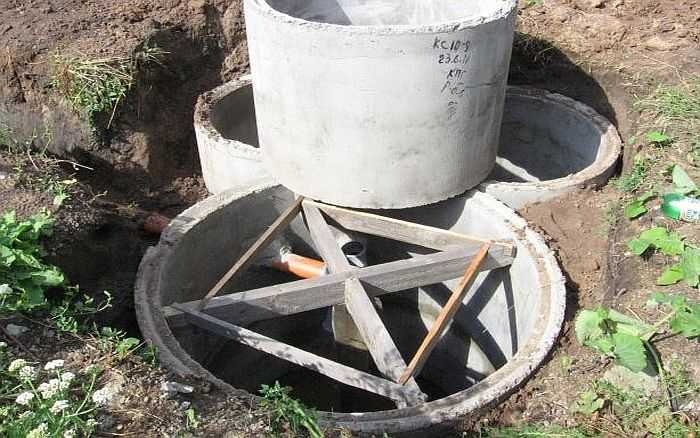
The second point of saving is that the revision entrance can be made one to three rings. Only all overflows must be installed in the area of its availability. There are no other features.

